Critical Difference: July 2009 Archives
Sometimes all your troubles stem from having learned to read. (Troubles, joys -- it's a mixed bag....)
| The Colbert Report | Mon - Thurs 11:30pm / 10:30c | |||
| Nailed 'Em - Library Crime | ||||
| ||||
July 28, 2009 3:46 PM
| Permalink
Amid the confusion of construction that has made a maze of Lincoln Center, the little tree-lined avenue that runs between the Metropolitan Opera House and Lincoln Center Theater might appear, from afar, to be an oasis. (Look! In the distance! Greenery!)


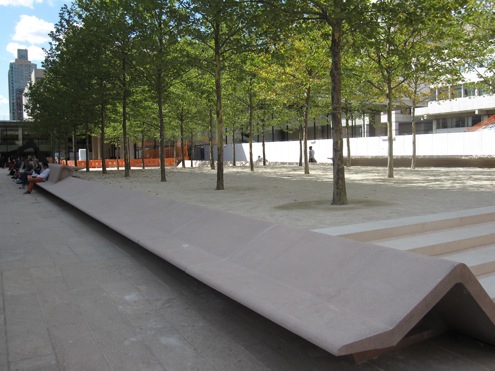
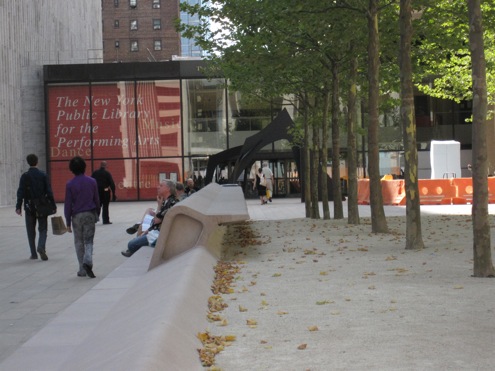


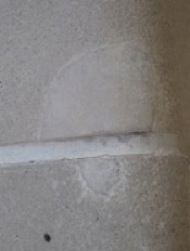
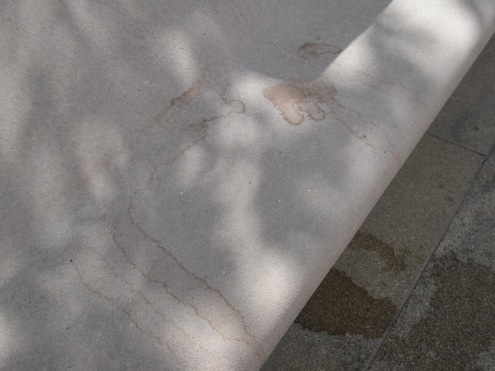
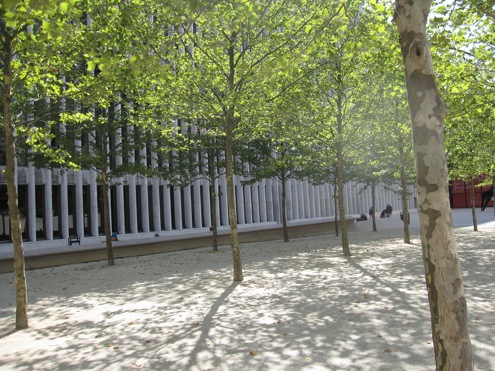

That impression would be a mirage, and not only because the adjacent reflecting pool, where Henry Moore's "Reclining Figure" once basked, is drained and demolished for reconstruction, too.
Nor is the main trouble the absence of the shady London planes that grew there in travertine planters, whose sides doubled as seating -- though I have mourned those trees, especially in wintertime, when the white lights of their snowflake ornaments used to sparkle after twilight.
The real trouble is the pair of horrid concrete benches that have been installed alongside the newly planted adolescent plane trees -- benches so repellent that Bloomberg's Jeremy Gerard yesterday described them as having "all the aesthetic appeal of an off-ramp on I-95." He was not employing hyperbole.

The phrase that leaps to my mind, however, is "housing project," closely followed by "community college." This is seating so cheap-looking and lacking in elegance that it would fit right in, were Lincoln Center one of those public spaces where good design isn't even an afterthought. (No, I am not taking a shot at people who live in public housing or study at community colleges. I am taking a shot at the tradition of designing those places to be aesthetically oppressive rather than pleasing.)
When I first saw the benches, my immediate impulse was to hope -- irrationally, but such is the nature of hope -- that somehow they weren't finished yet. Surely these drab things couldn't be part of the same project that resulted in a breathtaking Alice Tully Hall? But there they are, lining the plaza from Avery Fisher Hall to the New York Public Library for the Performing Arts.

If objections to them were limited to their appearance, their presence on the campus would be bizarre enough. What makes it exponentially more bewildering is that these objects that look so terribly utilitarian aren't practical, either.

For one thing, sandpapery concrete has a nasty tendency to catch on fabric. The first time I sat on one of the benches, I was wearing tights; they were instantly snagged. What about someone who's dressed up to go to a play or an opera or a concert -- particularly in the warmer months, when people aren't wearing coats? The benches, so convenient for awaiting a friend pre-show or formulating a plan post-show, will tempt them. But visitors' delicate clothing will be at the mercy of rough concrete, and they'll be left angry and embarrassed by snags and runs.
For another thing, the benches aren't holding up so well, after only a few weeks of use. Presumably, the durability of this seating, if not of the public's dress, was a significant consideration in its favor. So should Lincoln Center be asking for its money back, given that repairs evidently have been needed already? If the patching below is any indication, the future looks more than a little jagged and crumbly.

And, due to the benches' stain-absorbing surface, grubby as well.
Standing under the trees on a sun-dappled afternoon, it's possible to understand what effect the grove might have been intended to have on the plaza.
But it's never going to happen. The benches make sure of that.
SITI Company's "Radio Macbeth" alighted over the weekend at Columbia University's Miller Theatre, where Anne Bogart and Darron L. West's program note segued from discussing the production to issuing something of a challenge to the audience -- or, perhaps, explaining the bargain the audience had already entered into:
The theater is ultimately also about community. In the heat of the shared theatrical experience, an audience becomes its own society. You are here with a roomful of other people. Can you handle that? We are a community of people dealing with one another and challenging each other. The theater is about social systems and how individuals in communities function in concert. Can the planet be shared or does it just belong to me?
July 14, 2009 11:58 AM
| Permalink
There's a peculiar error -- or, at best, a mischaracterization -- in The New York Times' trend story today on the disappearing crossword puzzle: As Exhibit B, it submits The New York Sun's late, lamented crossword, a favorite of one Sam Szurek, an Upper West Side copywriter who was distraught to hear that The Atlantic Monthly is getting rid of its puzzle.
"Mr. Szurek's other favorite puzzle, the one in The New York Sun, gasped its last breath on the Internet last year (as did the rest of the newspaper)," the Times reports. The story continues: "As magazines and newspapers cut pages to save money, crossword puzzles, acrostics, sudokus and other games are being left on the production-room floor."
Um, the Sun's crossword, edited by the extraordinary Peter Gordon, gasped its last breath simultaneously in print and online when the Sun folded last fall. One assumes the Sun website is where a crossword fan in a New Haven suburb got the puzzle each weekday. According to the Times, she's "still suffering from the loss of the New York Sun crossword, and she wonders what the future will bring." But the puzzle was never banished from the Sun's printed page. Neither was the paper's sudoku feature, which was created by Frank Longo and went by the winningly cheesy moniker "Sun-doku."
The Sun, whose crossword was emblematic of its brainy bent (the Times, to its credit, notes the puzzle's "Ivy League street cred"), lost money by the barrel; that's what happens when you don't master the crucial skill of bringing in enough income to offset lavish spending. But it would have lost even more, had it taken the crossword out of the physical paper and alienated that feature's fervent, extremely vocal fans.
The wrath of puzzlers is not something to be trifled with. Nor is their passion. For more on that, see the Times story, in which a Bay Area librarian compares crossword solving to multiple orgasms.
The story makes an interesting point, too, about the tactile element of working crosswords:
Old or young, some people avoid crosswords online because the physical pleasures don't translate.
"There is something visceral about a ballpoint pen on newsprint that is not duplicated by pointing and clicking," said Ken Jennings, who is editing a book of crossword puzzles but who is best known as the sort of Roger Federer of the quiz show "Jeopardy."
On the subway the other day, I sat next to a woman who was doing a New York Times crossword -- which she had photocopied from the printed page. Her own paper? A co-worker's? I'm still wondering about that.
July 12, 2009 8:54 PM
| Permalink
The latest paranoid innovation in British education sounds like something only the U.S. would dream up. How distressing to realize that U.K. adults are equally likely to go absurdly overboard in their attempts to protect children from imaginary risks -- like, say, being assaulted or killed by that nice children's author who's come to address the entire school.
The Guardian's Alison Flood reports:
Set up in response to the murders of Jessica Chapman and Holly Wells by school caretaker Ian Huntley in 2002, the Independent Safeguarding Authority will vet all individuals who work with children from October this year, requiring them to register with a national database for a fee of £64.
That includes authors who appear at schools as guest speakers. Unsurprisingly, the notion of paying to be insulted and humiliated hasn't gone over terribly well with them.
"I refuse - having spoken in schools without incident for 32 years, I refuse to undergo such a demeaning process," former children's laureate Anne Fine told the Guardian. "It's all part of a very unhealthy situation that we've got ourselves into where all people who are close to children are almost seen as potential paedophiles."
Philip Pullman, fresh from volunteering at the Oxfam bookstore in Oxford (who but a dangerous character would do such a thing? let's hope they conducted a thorough background check), is also vowing this is the end of his visiting schools. "When you go into a school as an author or an illustrator you talk to a class at a time or else to the whole school," the author of the fantasy trilogy "His Dark Materials" pointed out. "How on earth - how on earth - how in the world is anybody going to rape or assault a child in those circumstances? It's preposterous."
As Pullman noted, refusal to be vetted won't harm the bank accounts of writers like him, whose books bring in substantial income. But other authors, who depend on money from school appearances, may have little choice but to fork over their cash and comply.
July 11, 2009 10:18 AM
| Permalink
Bizarre though it was to see all the headlines this week touting Al Franken's seriousness about his new job (he spends nearly eight months post-Election Day litigating the results of the vote, and there's any doubt about his seriousness?), Victor Navasky offers Minnesota's junior senator some good advice in a New York Times op-ed today: "Satire -- which has a long and refreshingly subversive history as a form of truth-telling and effective social commentary -- is Mr. Franken's comparative advantage in his new job and he should exploit this blessing, not deny it."
Navasky continues:
The Senate, let's not forget, is already filled with blowhards, policy wonks and, if you will, lying liars. It's a mistake to assume that if he puts his comic talents to work in the Senate, like Rodney Dangerfield, Mr. Franken will automatically lose its respect.
It's understandable that Franken wants to be both respected as a legislator and respectful of the institution he's finally joined. It's only natural that he'd be wary of being cast, and marginalized, as the class clown. But Franken isn't just a comedian; he isn't just a freshman senator. He's also an author who did an extraordinary job, in "Lies and the Lying Liars Who Tell Them," of harnessing humor to make a case built on painstaking research (conducted with a team of students while he was on a fellowship at Harvard's Kennedy School of Government) and broad knowledge of the political landscape. The guy knows the subversive power of making people laugh in order to make them think.
And, let's face it, he's not exactly Sonny Bono or Fred Grandy. Unlike Cher's ex, who became a representative from California, or Grandy, the actor who played Gopher on "The Love Boat" before he was elected to the House from Iowa, Franken is well known as an egghead. He already has intellectual and policy cred.
"Fools are my theme, let satire be my song," Lord Byron wrote. From Aristophanes to Jon Stewart, humor has been one of the most potent of rhetorical tools, and Franken has been employing it to talk about politics for decades. Smart, politically acute comedy is even experiencing something of a heyday right now; witness Stewart, Stephen Colbert and the parade of politicians eager to be their guests. And Washington is not without legislators, like Massachusetts Rep. Barney Frank, who make serious points with lacerating humor.
Though Franken's job isn't comedy anymore, he honed some undeniably transferable skills as an entertainer. Opponents may be waiting to pounce on him for any display of jocularity, but it's a mistake for them, and for him, to view his ability to deploy precision ridicule as anything but a strength. As Barney Frank has said, "Ridicule doesn't work unless the subject is ridiculous."
On ARTicles, the National Arts Journalism Program blog, my take on The Wall Street Journal's plan to develop a New York-specific culture section.
July 8, 2009 2:05 PM
| Permalink
Sitting in the audience at the Public Theater is different from sitting in the audience at nearly any other theater -- and not just because the rumble of the subway intrudes into some of the performance spaces. What's most distinctive is the scope of the assembled: Young, old, gay, straight, male, female, the crowd spans races, ethnicities and economic classes. Even in New York, that's an aberration, and an invigorating one.
To someone who believes "diversity" is merely a buzzword, not a key to people's understanding each other, there probably isn't much significance to a theater's drawing people from so many walks of life to sit and breathe together in the darkness, watching and listening to a story enacted before them. Maybe finding beauty in that is a question of ideology, of belief systems. I come down firmly on the side of diversity as a social good, a sign of health, and something to be actively sought -- not by lowering standards, and certainly not by enforcing quotas, but by casting a wide net and keeping the goal of diversity in mind at all times. That's as important in seeking artists as it is in seeking audiences.
So when I wrote yesterday that Oskar Eustis' male-heavy programming at the Public is disappointing, I was not suggesting that one of the American theater's most activist-liberal artistic directors, or anyone else, ought to be subjected to quotas. I simply meant to say that the Public's audience, the bracingly varied audience Eustis inherited, deserves subscription-series programming that better reflects its makeup. To achieve that, female playwrights and directors need to be working at the Public in greater numbers.
Assembling a season of good plays is a delicate balancing act. There are innumerable factors to take into account. Diversity is only one of them -- and the sex of playwrights, directors, actors and other artists is hardly its sole measure. No single season can be taken as representative of the whole, either. But over time, it's been strange and striking how very often Eustis' choices have favored the guys.
